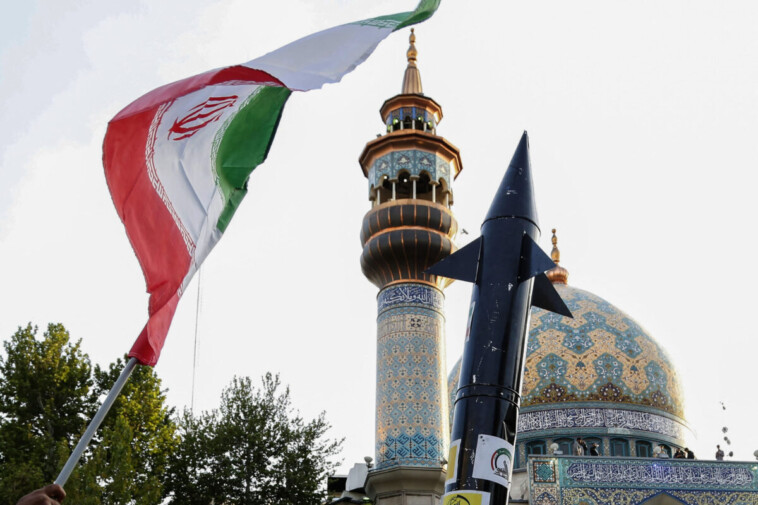In late June 2024, around 40 Iranian-Germans protested against Hossein Mousavian and his relations with the Körber Foundation in Hamburg. This think tank, founded by Kurt A. Körber, a member of the Nazi party who worked for Universelle-Werke J. C. Müller & Co. and advanced Hitler’s war goals, had hosted Mousavian at a May breakfast event, but after a tide of criticism, the think tank deleted its X post. Körber embedded four photographs of people at the breakfast, including pictures from Mousavian.
The Munich Security Conference and the Körber-Stiftung selected 7 people who work for the Islamic Republic’s Foreign Ministry as international participants to be their Munich Young Leaders fellowship in recent years.
What do these protesters have against Mousavian, a “Middle East specialist” at Princeton University? He can be followed in four cases: the consolidation of the ideology of terror, the supervisor of a terror project (24 killed) in Europe in the ’90s, the agent of the regime’s normalization while advancing its nuclear program, and his financial corruption (convicted) in Iran.
Propagandist
By just focusing on Mousavian’s activities in Resalat Daily between 1985 and 1990, I can show who he really is. During this period, he rarely wrote a piece under his name in this propaganda outlet, and the authors were mainly members of the Qom Seminary Instructors Association, members of the Mu`talfa Party, and people close to these hardliner groups. Other than these terror groups’ members, the rest of the content was published anonymously, with a pseudonym or under the title of the cultural or political section. These people were all followers of Khomeini who was anti-Semitic, anti-Baha’i, anti-women, and anti-LGBTQ.
Terror Regime, Terrorist Officials
In many cases, people look for evidence and documents for the problems in front of their eyes. We don’t need to provide any evidence for Mousavian to be an agent of the Islamist regime other than his positions in the last 45 years. He was and still is the agent of the Islamist terrorist regime. Even in Princeton, he has been promoting the regime’s nuclear agenda.
Considering the regime’s terrorist, brutal, and oppressive policies towards the Iranian people, the agency of this regime at high levels automatically turns a person into a criminal. Without contributions in complicity and cover-ups, people cannot be in the regime’s high-ranking positions. This alone is enough reason to fire Mousavian from Princeton. He is in Princeton to whitewash the crimes of the regime against humanity, and not to promote security and world peace.
In an outlet where Mousavian was on the editorial board (under the title of “central council” instead of the editorial board), this propaganda outlet was continuously promoting and praising terror and terrorism. Note that Fada’iyan (Devotees) of Islam, whose assassination actions were commemorated by this outlet, was a terrorist organization that assassinated two prime ministers. It also attempted to assassinate the Shah but failed. The Devotees of Islam also assassinated secular intellectuals such as Ahmad Kasravi. The Qom Seminary Instructors Association was the financier of terror activities and the provider of religious justifications for terror. Khomeini also supported these groups financially and ideologically.
Tickets for “Am I Racist?” are on sale NOW! Buy here for a theater near you.
During February and March of 1989, Resalat in one month, advertised and promoted Khomeini’s issuance of a fatwa on the killing of Salman Rushdie with big headlines every day. The editorials on 27 Bahman and 9 Esfand of 1367 (February 16 and 28, 1989, both probably under pseudonyms) fully defended the issuance of this fatwa, which is the outlet’s position and therefore Hossein Mousavian’s.
Contrary to popular belief, terrorism does not only happen when a group or individual shoots a political opponent, writer, or religious dissenter or presses the button to detonate a bomb. Terrorism is triggered when a religious scholar or political leader issues an order to eliminate the opposition or dissenters. The rest of the story is about the execution. The case of Salman Rushdie and his assassination four decades after Khomeini’s fatwa is a good example.
In this sense, Mousavian’s role in launching the Resalat and his responsibility in the Tehran Times, as a propagandist, promoter, and legitimizer of terrorism, is even more important than his role in the assassinations of dissidents in the 90s in Europe. Resalat has been a propaganda mouthpiece and not a newspaper in a free country. In a propaganda outlet, the materials and authors are selected in advance by the “central council” and every published article, piece, or news is aimed at advancing an agenda, plan, or narrative. Therefore, every member of the central council – like communist bulletins – is responsible for what is published in the outlet, and the responsibility of any article is not solely on the shoulders of the author. In a propaganda bulletin, the content is not just filtered through the council but what goes into the filter is pre-determined and ordered based on a specific political agenda.
Mousavian was the editor or chief editor (in some issues) of Resalat Daily which has been the pioneer of the narratives of elimination, purge, and executions. One of the outlet’s policies for which Mousavian is responsible as a member of its central council was the promotion of terrorism whether praising Suleiman Khater’s action, an Egyptian terrorist (January 28, 1986) or calling Prime Minister Mansour’s assassination a “revolutionary execution” (Badamchian’s piece, March 2, 1986; commemoration of the assassination day, January 20, 1986).
This outlet calls every assassination of the Pahlavi regime’s officials a “revolutionary execution.” During Mousavian’s work, the outlet arranged interviews with every terrorist or theoretician of terrorism who entered Iran, such as Ahmad Ra’if, one of the ideologues of the Muslim Brotherhood (February 16, 1987). Resalat constantly glorified Muslim terrorists inside and outside the country and still does so. This is its policy.
The following methods are used in the contents of this newspaper: dividing the world into those who dominate (non-Muslim) and those who are dominated (Muslim) in numerous op-eds and articles, attributing every issue during the Pahlavi dynasty to Western foreigners such as removing hijab, Bahaism, and homosexuality. According to the newspaper op-eds, America and Europe are responsible for starting the Iran-Iraq war, and the West is racist.
Underlying Method
Resalat Daily had a very clever way to promote terrorism and mass murder. This outlet prepared the mentality of the society for killing without informing. For example, on the subject of the 1988 massacre in prisons, it did not even provide a single line of news about this story during which 3,000-5,000 people were executed; but by publishing a series of articles under the title “Ghost of the Monster” subtitled “A narrative of the crimes of the hypocrite terrorist network” (an episode of it on August 6, 1988 under the pseudonym M-K, which is a security agent) tries to justify and legitimize the killing of members of the MEK organization.
Mousavi Ardebili, the head of the Supreme Court and imam of Tehran’s Friday Prayer, gave a speech about the necessity of removing and executing the opponents. Resalat published his anti-due process words in large fonts without any criticism. It is unlikely that the editors of the newspaper, including Hossein Mousavian, were unaware of the executions of thousands of opponents in prisons. In this sense, he is responsible for hiding the story. Resalat published Ardebili’s words on August 6, 1988. As a judiciary official, he asks the judicial authorities: “Why don’t you try and execute the MEK members?” He immediately puts aside the re-trial of the prisoners who have already been convicted in the kangaroo courts and says: “They don’t deserve a trial. Their sentence is death.”
In publishing these words, Mousavian did not question Friday Prayer leaders’ and the judicial officials’ statements in an editorial note. The editorial should have asked why the government executes previously convicted people without a trial. In the final days of the executions, Ali Khamenei said: “The Islamic Republic remains arrogant and will become stronger and more stable day by day,” (Resalat, August 27, 1988). In this case, no one in the newspaper asked him how the Islamic Republic is getting stronger day by day while it is busy killing.
Appeasing Appointment
The appointment of Hossein Mousavi at Princeton University violates all academic principles in the world. Beyond allocating an academic position without public ad and competition and considering academic qualifications, Mousavian has been placed in his position with the advice of politicians and financiers only because of his dark political records to be a deal maker in the nuclear agreement. This placement violated the academic and administrative independence of universities. Princeton’s decision-makers most likely agreed to such a ridiculous act only to gain more access to federal public resources or to increase their influence through the federal government channels. Mousavian did not have a scientific record before being hired, and his role was mostly as an intermediary for his respective government and advancing its interests.
Majid Mohammadi is an Iranian-American author, sociologist, and political analyst.
The views expressed in this piece are those of the author and do not necessarily represent those of The Daily Wire.



